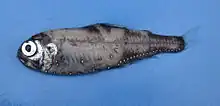Electrona antarctica
The Antarctic lanternfish or Electrona antarctica mainly inhabits the Antarctic deep, warm waters. It the dominant species in the Southern Ocean. Their life span is about 4–5 years and they mature after 2–3 years. Their maximum length is 12.5 cm. Their feeding depends upon area to area. Small fish primarily feed on copepods, euphausiid larvae, and hyperiids.[3] This species is mainly the nektonic prey species of seabirds in open water.[4] It is an important krill predator and serves as prey for a majority of seabirds.[5] It is one of the southernmost fish species, being recorded as far south as 74°40′S in the Ross Sea.[6]
| Electrona antarctica | |
|---|---|
 | |
| Scientific classification | |
| Kingdom: | |
| Phylum: | |
| Class: | |
| Order: | |
| Family: | |
| Genus: | |
| Species: | E. antarctica |
| Binomial name | |
| Electrona antarctica (Günther, 1878) | |
| Synonyms[2] | |
| |
References
- Williams, A. (2019). "Electrona antarctica". IUCN Red List of Threatened Species. 2019: e.T130346041A130414300. Retrieved 7 April 2020.
- Froese, Rainer and Pauly, Daniel, eds. (2019). "Electrona antarctica" in FishBase. December 2019 version.
- Giovanni, T.M, Wing-Keong Ng, Douglas Redford Tocher. "Fish Oil Replacement and Alternative Lipid Sources in Aquaculture Feeds">"Alternative Marine Resources". Fish Oil Replacement and Alternative Lipid Sources in Aquaculture Feeds, 2011.
- "Species Composition and Distribution". Biology of the Southern Ocean, Second Edition, 2007.
- Greely, T. M.; Gartner Jr, J. V. & Torres, J. J. (1999). "Age and growth of Electrona antarctica (Pisces: Myctophidae), the dominant mesopelagic fish of the Southern Ocean". Marine Biology. 133 (1): 145–158. doi:10.1007/s002270050453. S2CID 84126110.
- http://nora.nerc.ac.uk/id/eprint/508228/1/Atlas_Chap.7-Duhamel_et_al_2014-F.pdf
This article is issued from Wikipedia. The text is licensed under Creative Commons - Attribution - Sharealike. Additional terms may apply for the media files.
